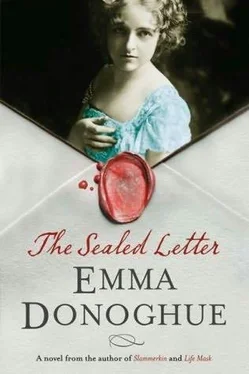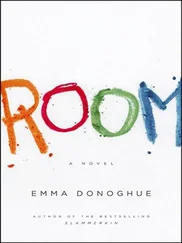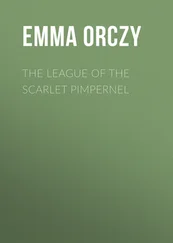Hawkins nods twice, as if to stem her nervous flow of words. "Now for the night of the eleventh," he says portentously. "What time did you and Mrs. Codrington retire to bed?"
Her body's as rigid as a mummy's. "About ten, perhaps? I'd taken medicine," she says, getting the fact out brusquely. "I fell into a deep sleep."
"And woke up at what time?"
"I've no idea." She clears her throat, too loudly. "All I remember is that the fire was low and I saw a white figure leaving the room."
Hawkins frowns slightly. "No no, Miss Faithfull, take it from the beginning."
"I have done so," she says through clenched jaws.
He doesn't understand; he still thinks his star witness just needs a little encouragement. "First the petitioner came in through the communicating door?"
Fido shakes her head. "I woke, and saw a white figure going out the door, and presumed it was the admiral, as no one else was in the habit of coming in, and Mrs.-the respondent-said afterwards that it was he." She's gabbling. It's all the literal truth, so why does it feel like a lie?
Hawkins, frowning again, refers to his notes. "Was he in his nightshirt?"
"His dressing gown, I believe." That's not half as bad. "Really, it was all so very rapid that I could hardly tell what I saw; I was still drowsy from my medicine."
"Had he his trousers on?"
"I'm sure I can't say," she snaps.
"What else do you wish to tell the jury about the incident?"
"Nothing."
A long glare from the barrister. "Miss Faithfull, I feel sure it's from womanly compunction, rather than from any wish to perjure yourself, that you're holding back."
The word perjure makes her pulse thump loudly. She shakes her head. She keeps her eyes away from the part of the courtroom where her sister's sitting. How will Esther report all this to the Faithfulls?
"Need I remind you that you gave a drastically different account of this incident to the respondent's solicitor, Mr. Few, on September the twenty-ninth?"
Black spots in front of her eyes. "I'm aware of that," she says, almost stuttering, "and I'm relieved to have this opportunity to clear up any misapprehension."
"Misapprehension?" Hawkins's smooth voice cracks. "Madam, either you were lying in assenting to that affidavit, or you're lying now!"
The jury watches Fido, open-mouthed as fish. At the lawyers' table, Few sits staring up at her with mute fury. She looks at her hands. "No, I believe I told Mr. Few what I have just told you," she says, stammering a little, "but with some details added."
"Yes, including one significant detail," Hawkins storms, "namely that what woke you was-allow me to quote from the fourth paragraph- The petitioner in his nightdress came into the room and got into the bed where Mrs. Codrington and Miss Faithfull were sleeping together, and attempted to have connection with Miss Faithfull, and was only prevented from accomplishing his purpose by the resistance of Miss Faithfull on waking up"
The hum of talk among the audience deafens her. Her face feels as if it's crackling with flames. Faintly: "That was what Mrs. Codrington said."
"Speak up," advises the judge.
Fido raises her voice. "Just before my interview with Mr. Few, she-the respondent-told me that her husband had… behaved improperly to me on the night in question. She persuaded me that the drug I'd taken had erased my recollection of the incident."
Hawkins's eyes are bulging.
She hurries on. "It must be understood that it wasn't that I gave Mr. Few the whole account as from my own memory; he already had it from Mrs. Codrington, and I felt I was being asked only to support her evidence. Particulars were barely mentioned, and he put things delicately, to spare my feelings," she says desperately. "When he asked me whether the account was true, I gave him to understand that the answer was yes, because I sincerely believed what my friend had told me."
"Come, Miss Faithfull!" The barrister is almost shouting. "You're an educated person. And, may I add, a celebrated advocate for the competencies of women. You must know that when a lawyer asks you a question, he means you to answer on your own authority. Mr. Few passed you the affidavit to read-"
"He slid it across the desk," admits Fido, "but I wasn't able to read it through, not so as to know its contents. I was very much confused and agitated, and my breathing was troubled; also Mr. Few was talking the whole time, so I couldn't concentrate." Women are idiots, she thinks, that's the burden of my testimony. Feathery creatures who couldn't be logical if their lives depended on it, who lack the capacity for the civil duties that would go with civil rights.
"You formally assented to the document!"
"I didn't dissent from it," she says miserably, "but I do not recall saying that it was correct in all particulars. I deeply regret the trouble my ignorance of the law has caused," she rushes on, turning towards the grim judge. "I see now that I ought to have explicitly stated to Mr. Few that his client was my source. Later that day I had reservations, and asked for the affidavit back, but it was too late." She looks anywhere but at her sister sitting in the fifth row. "In a moment of weakness, I went abroad to avoid being summoned to repeat the story in this court."
Hawkins looks disgusted. "Well, Miss Faithfull. Although you were in a stupor at the time, do you now believe that the petitioner attacked you, just as the respondent related?"
He thinks me excessively scrupulous, Fido realizes. "No," she says into the silence, very clearly.
His eyes lock onto hers. "You must admit that what you do recall-waking up in a sudden terror, glimpsing his fleeing form-is not incompatible with attempted violation."
She takes a long breath. "I never said I was terrified, or that the person I saw was fleeing." She must go further, if she's to look herself in the eye in the mirror tomorrow morning. "It's my firm belief, now, that nothing happened that night."
"Nothing?" The barrister's Adam's apple is bulging.
"That the admiral came in while I was asleep, exchanged a few words with his wife, and walked back to his own room."
There's a silence, while Hawkins gathers his forces. "You realize, madam, that you're accusing your dearest friend of inventing the most appalling falsehood in order to pervert the just process of this court?"
Fido is mute. And then says thickly, "Perhaps she dreamed it," which raises a great whoop of laughter from the audience.
"Could it be, I wonder, that someone has threatened you in some way, to force you to change your story?"
Her skin crawls. She mustn't look over at Harry. This is what happened, Fido reminds herself desperately, but she's never felt more of a liar. "No," she insists, "having had time to think it all through, I've resolved to do my duty and tell the whole truth."
"I have one more suggestion," snarls Hawkins. "Perhaps the admiral's attempt on your virtue that night was successful?"
She reaches out blindly for the wooden edge of the witness box; holds onto it so she won't fall down.
"I put it to you that all this talk of drugged stupors and blanks in memory is a futile endeavour to deny the horror of what happened."
"Mr. Hawkins!"
"If the petitioner is guilty of adulterous rape, madam, no one will blame you for having fallen a helpless victim to his lust."
"I-"
He plunges on. "But if in a feeble attempt to save your reputation, you cover up his crime and thereby destroy my client-"
"There was no crime."
A single blink from Hawkins. Then he changes his tone again. "Ah, then perhaps you did not resist?" he asks.
So mildly, almost pleasantly, that at first she doesn't follow. She stares at him.
"Half-consented, in fact, to overtures from your friend's handsome husband, with whom you'd lived on the most intimate domestic terms for more than three years? Allowed connection to be achieved, there in the bed a matter of inches from his sleeping wife?"
Читать дальше












